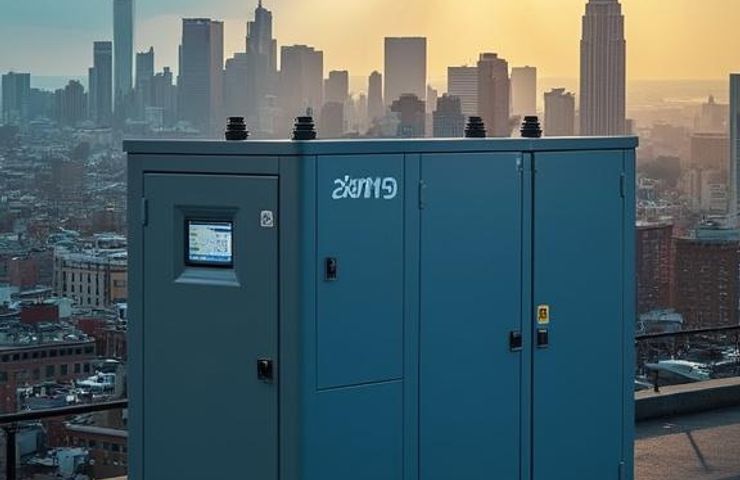
Hydrogen Fuel Cells for Resilient US Infrastructure: GenCell’s White Paper
August 19, 2025With the U.S. power grid under mounting pressure from extreme weather, aging equipment, and cyber threats, having continuous, clean backup power is more important than ever. In a new white paper, GenCell Ltd. makes a compelling case that hydrogen fuel cells deliver the kind of resilient power systems we need for critical infrastructure, EV charging stations, and industrial electrification across America.
Core News Summary
On August 18, 2025, GenCell Ltd.—an Israeli company specializing in alkaline fuel cell tech—released a white paper championing hydrogen fuel cells to bridge reliability gaps in the U.S. grid. The report points out that these systems keep the lights on during outages, emit only water and heat, and integrate smoothly with renewable sources. From telecom towers and data centers to EV charging hubs and industrial sites, GenCell’s solutions are built to scale. They also align perfectly with the Department of Energy’s hydrogen hub initiatives and the broader push for clean energy.
Technical Deep Dive: Alkaline Fuel Cell Design
GenCell’s alkaline fuel cells use non-precious metal catalysts and a durable electrolyte to spark the reaction between hydrogen (supplied to the anode) and oxygen (drawn from ambient air at the cathode). Each stack turns chemical energy directly into DC power with 45–55% efficiency, and the heat generated can be reclaimed for space heating or preheating processes. As long as you’ve got a steady supply of compressed or liquid hydrogen, these units can run continuously for hours—or even days—making them perfect for critical backup power. Their modular, skid-mounted design allows for rapid on-site deployment and easy capacity expansion, while integrated power management software handles load sharing and maintenance scheduling.
Strategic Implications for U.S. Energy Resilience
The U.S. grid has been rattled by hurricanes, wildfires, winter storms, and even cyberattacks. In response, federal and state agencies are pouring funds into hydrogen research, pilot programs, and regional hubs. GenCell’s white paper argues that installing fuel cells at substations, hospitals, emergency command centers, and along EV charging corridors not only boosts resilience but also slashes carbon. “Hydrogen fuel cells can close the U.S. power gap, support critical infrastructure, EV fleets, and industrial electrification,” the paper states, pitching them as the perfect complement to batteries and diesel generators.
Environmental and Economic Impact
Replacing diesel or gas-fired generators with hydrogen fuel cells cuts CO₂ emissions at the point of use by up to 100%, and reduces local pollutants like NOₓ and particulate matter. On the economic side, GenCell highlights the promise of domestic green hydrogen production—using renewable-powered electrolysis—to create new jobs in manufacturing, engineering, and maintenance. While upfront costs might be higher, savings on fuel and upkeep, plus incentives from the Inflation Reduction Act and Bipartisan Infrastructure Law, can make these projects economically attractive over a 10–15 year lifecycle.
Company and Policy Context
Founded in 2011, GenCell Ltd. has made its name delivering off-grid and backup power solutions for telecom towers, defense sites, and remote industrial facilities. Their white paper arrives just as the DOE’s 2025 hydrogen initiative ramps up—with plans for multiple hubs and a surge of private investment. GenCell’s vision dovetails with federal goals to decarbonize critical power and build a domestic hydrogen economy capable of fueling large-scale industrial electrification.
Perspectives and Challenges Ahead
Even with the technology ready to roll, hurdles remain. Driving down costs—for both fuel cells and green hydrogen—is critical for widespread adoption. Expanding hydrogen infrastructure like pipelines, storage, and refueling stations requires tight coordination between utilities, regulators, and private developers. Safety standards and streamlined permitting processes must keep pace with deployment. GenCell’s paper calls for targeted R&D grants, public–private partnerships, and policy reforms to knock down these barriers.
Closing Insight
As the U.S. shapes its hydrogen strategy and regional hubs take form, GenCell’s white paper lays out a practical roadmap for weaving fuel cells into America’s power fabric. By tackling cost, infrastructure, and policy issues head-on, hydrogen fuel cells can evolve from niche backups into a scalable backbone of clean, uninterrupted energy for critical services nationwide.
About GenCell Ltd.
GenCell Ltd. is an Israel-based developer and manufacturer of alkaline hydrogen fuel cell solutions, founded in 2011. The company focuses on backup and off-grid power for critical infrastructure, utilities, EV charging, and industrial electrification, publishing white papers and thought leadership to drive global hydrogen adoption.



 With over 15 years of reporting hydrogen news, we are your premier source for the latest updates and insights in hydrogen and renewable energy.
With over 15 years of reporting hydrogen news, we are your premier source for the latest updates and insights in hydrogen and renewable energy.